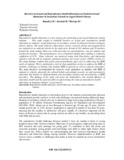Barriers to Sexual and Reproductive Health Education on Students Sexual Behaviour in Secondary Schools in Lugari District Kenya
Abstract
Reproductive health education is a key strategy for promoting good sexual behaviour among
students. This study sought to establish barriers to sexual and reproductive health
education on students’ sexual behaviour in secondary schools in Likuyani division of Lugari
district, Kenya. The study utilized a Descriptive survey research design and targeted form
two students in six selected schools in the study area. A total of 241 students and 30 teachers
formed the study sample. Data was collected using two questionnaires, one for students and
another for teachers. The questionnaires were considered reliable after yielding a cronbachs
coefficient of 0.70. Data collected was analyzed using both Descriptive and inferential
statistics with the aid of computer statistical package for social science (SPSS) version 17.
The study findings confirm that policy and programmatic gaps exist in addressing the RHE
needs of students. This is attributed to, lack of clear guidelines on how to address the RHE of
students, challenges of dealing with students RHE in general as well as cultural constraints.
The study therefore recommended the need for clear guidelines on dealing with RHE of
students in schools; demystify the cultural beliefs and attitude towards sex and reproductive
education that hinder its implementation and providing training and reorientation of RHE
providers. The findings of the study will assist all stakeholders, who include Ministry of
education, health and the general public in appreciating the value of reproductive health
education, in changing students’ sexual behavior

